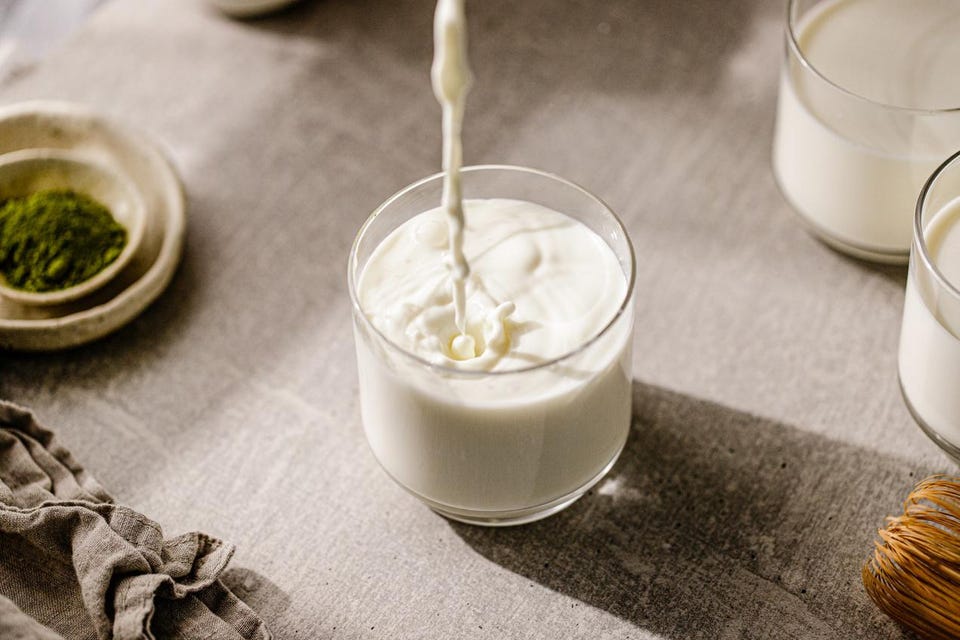Sustainability French Cow-Free Milk Protein Company Has What Dairy Manufactures Crave For Daniela De Lorenzo Contributor Opinions expressed by Forbes Contributors are their own. I write about sustainable food & agriculture production systems. New! Follow this author to stay notified about their latest stories.
Got it! Aug 30, 2022, 02:45am EDT | New! Click on the conversation bubble to join the conversation Got it! Share to Facebook Share to Twitter Share to Linkedin Over 150 million tonnes of raw milk are produced in Europe each year getty Animal protein production accounts for 82% of food’s carbon footprint in the European Union, and the environmental impact of dairy production is no less, with its yearly 150 million tonnes of raw milk . To curb livestock emissions is a prerogative in order to reach the goals within the EU green deal. The growing demand for protein and sustainable food production is therefore sparking interest in expanding protein sources and in finding complementary ways of producing them: “It’s a bit like the energy mix,” says Stéphane Mac Millan, co-founder of Bon Vivant .
“We are relying on different sources of energy and this is why we also need to have the same approach in our food production models with complementary methods of production,” he continues. The Lyon-based company is developing a method to produce cow-free pure milk protein. Bringing their proteins to the mix makes products texture thicker, adding a mouthful sensory feeling to products such as plant-based milk, which usually have a watery consistency.
Dairy companies have been craving these ingredients as they can have enormous benefit on their environmental performances, while, thanks to their improved taste, being easier to get consumers acceptance. Provider and Partner While many companies focus on developing their end products and go solo on the market with their branded cow-free cheeses, ice creams, yogurts or milk, Bon Vivant has a different strategy: “We are agnostic when it comes to end products. We are a B2B oriented company and we want to provide ingredients and expertise to milk manufacturers to help them develop their products,” continues Mac Millan.
According to Mac Millan, being an ingredient provider for the dairy manufacturing giants, is the best way to have a major impact at scale in the sector and help democratize faster alternative dairy production. MORE FOR YOU Is Carbon Capture Another Fossil Fuel Industry Con? Sustainable Fashion Wants Brands To Redefine Business Growth Trouble With Predicting Future Of Transportation Is That Today Gets In The Way Despite developing food, Mac Millan defines Bon Vivant as a “deep tech” company, due to the amount of technology and knowledge involved in the precision fermentation process able to engineer the yeast strain and develop the dairy protein: “maybe even more than other companies, we have very specific tech approach that will allow us to have own IP and patents,” he adds. The plan is to set partnerships, whereas they are now in conversation with most of dairy manufacturer in France, Switzerland and Germany: “We will work with them to understand what are the functionalities that they need, the amount and typology of protein they need, but also provide expertise on food formulation to create recipes and set processes in their factories,” he continues.
Bon Vivant will solely ship their ingredients and the companies will be able to add it to their mix and produce either hybrid or fully plant-based diary alternatives. Healthier products on the shelves The gains on the environment side are plurimous as increasing complementary ways to produce milk without the need of cattle can diminish for example land and water use: “Also, it’s just not natural for cows to produce 35 liters of milk on a single day. ” debates Mac Millan.
But this kind of ingredient can have multiple benefits on human health, too. Cow’s milk is the most widespread food allergy across the world, whereas precision fermented milk would be suitable at least for lactose intolerant consumers without creating health concerns. Likewise widespread food allergies are caused by nut fruits – such as almonds or soy – which are the basis for many alternative plant-based beverages.
Consumers might then be able to consume alternative or hybrid products without the fear of feeling sick or taking extra medications. Additionally, these proteins can decrease the use of sugars and edulcorants that companies are used to including in their yogurts, milkshakes or cheeses to make the taste better. This could bring hybrid products to have shorter ingredients lists aside from becoming truly healthier choices.
With their scooped $ 4 million to progress its R&D capacity in April 2022, the company is now focusing on producing at scale one of their proteins in their plant in Lyon. The aim is to have their regulatory approval by 2023 so to go on the market in the beginning of 2024. Follow me on Twitter or LinkedIn .
Check out my website . Daniela De Lorenzo Editorial Standards Print Reprints & Permissions.
From: forbes
URL: https://www.forbes.com/sites/danieladelorenzo/2022/08/30/french-cow-free-milk-protein-company-has-what-dairy-manufactures-crave-for/
